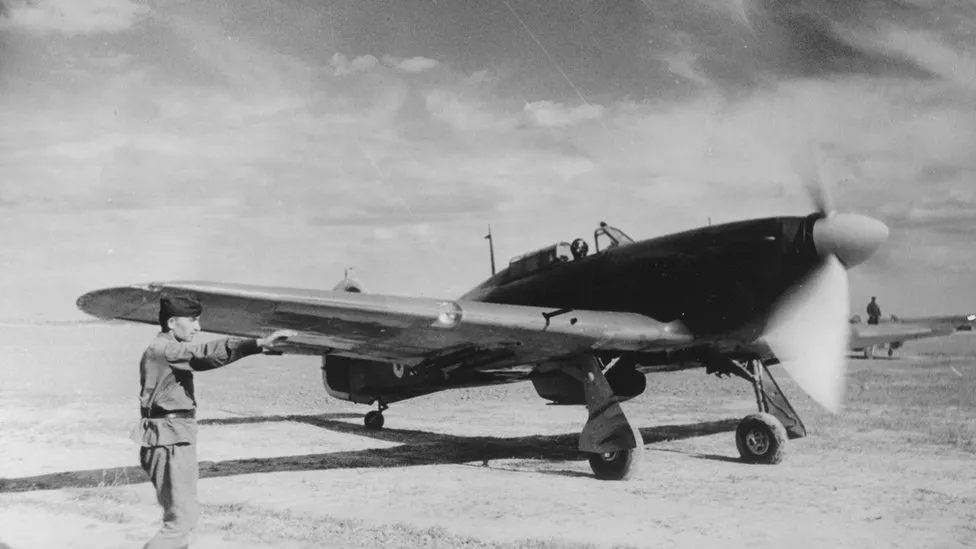The rusting remains of eight British Hurricane fighter planes dating back to World War Two have been found buried in a forest in Ukraine.
The aircraft were sent to the Soviet Union by Britain after Nazi Germany invaded the country in 1941.
They were part of a package of allied military support for the USSR, paid for by the United States under the so-called Lend-Lease scheme.
Similar legislation is being used by the US government today to send military aid to Ukraine as it seeks to expel Russian forces from its country.
Aviation experts say this is the first time the remains of so many Hurricanes have been found in Ukraine.
"It is very rare to find this aircraft in Ukraine," says Oleks Shtan, a former airline pilot who is leading the excavation. "It's very important for our aviation history because no Lend-Lease aircraft have been found here before."
The Hawker Hurricane was the workhorse of the Battle of Britain - the air campaign of 1940 when the Royal Air Force (RAF) defeated German attempts to invade the UK. Although its role has often been overshadowed by the newer and more adaptable Spitfire plane, the Hurricane actually shot down more than half of all enemy aircraft during the battle.
"The Hurricane was a strong, easy to fly machine," Mr Shtan says. "It was stable as a gun platform and suitable for inexperienced pilots. A reliable aircraft."
In total, about 3,000 Hurricanes were sent to the USSR between 1941 and 1944 to support the Soviet war effort. Most were either destroyed in combat or dismantled later for parts.
But some Hurricanes were deliberately broken up and buried after the war so the Soviets did not have to pay back the United States. Under the Lend-Lease legislation, the USSR was required to pay for any donated military equipment that remained intact after hostilities ended.
This was the fate of the eight Hurricanes found buried in woodland south of Kyiv - now the capital of independent Ukraine, but until 1991 part of the USSR.
They had been stripped of their instruments, radios, machine guns and any useful scrap metal. They were then dragged by tractors from a nearby airfield, broken up and dropped without ceremony into a shallow ravine. It is thought they were then covered with earth by bulldozers.
The remains were discovered recently after an unexploded bomb dating from the war was found nearby. The rest of the ravine was checked using metal detectors and the Hurricanes were found.
The National Aviation Museum of Ukraine is now in the process of painstakingly excavating the site by hand. Staff there aim to identify as much of the aircraft as possible so they can be reassembled and put on display.
Valerii Romanenko, head of research at the museum, says the Hurricanes played an important part in Ukraine's history.
"The Hurricanes are a symbol of British assistance during the years of the Second World War, just as we are very appreciative of British assistance nowadays," he says. "The UK is one of the largest suppliers of military equipment to our country now."
"In 1941 Britain was the first who supplied fighter aircraft to the Soviet Union in mass scale. Now the UK is the first country which gives Storm Shadow cruise missiles to our armed forces."
It is thought there are just 14 restored Hurricanes able to fly in the world today.
After the German invasion, the USSR lost many warplanes and was in desperate need of fighter aircraft. Initially several RAF Hurricane squadrons were sent to the Arctic to help.
But soon the British pilots left and the aircraft were taken over by Soviet airmen. Records show that many disliked the Hurricane, considering it under-powered, under-armed and under-protected.
By the end of the war it was considered obsolete and was used mainly for air defence work. The eight Hurricanes found south of Kyiv were used to defend major transport hubs - especially railway stations and junctions.
https://www.bbc.com/news/world-europe-65955365

